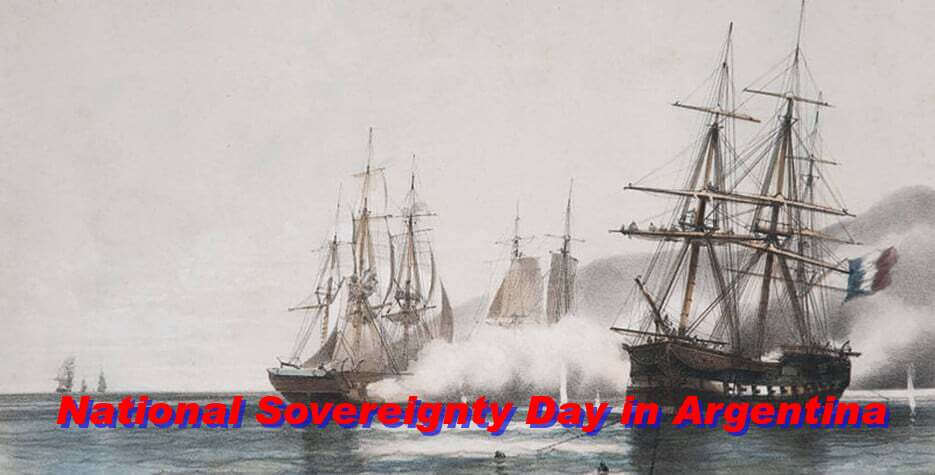National Sovereignty Day in Argentina, known as “Día de la Soberanía Nacional” in Spanish, is a public holiday observed on November 20th. This day commemorates a significant event in Argentine history, the Battle of Vuelta de Obligado, which took place on November 20, 1845. Here are the key aspects of this holiday:
- Historical Background: The Battle of Vuelta de Obligado was a crucial confrontation during the Anglo-French blockade of the Río de la Plata. Argentina, under the leadership of Juan Manuel de Rosas, resisted the Anglo-French fleets that attempted to navigate the Paraná River without consent from the Argentine government. This act was seen as an infringement on Argentine sovereignty.
- Significance of the Battle: Although militarily Argentina was not victorious, the battle symbolized a strong stand against foreign intervention and the defense of national sovereignty. It marked a key moment in Argentine history where the country asserted its autonomy and rights over its waterways and territory.
- Observance: National Sovereignty Day was established as a public holiday in Argentina in 2010. The date was chosen to honor the courage and resistance shown by the Argentine forces in the face of external pressures. It serves as a reminder of the country’s struggle for independence and sovereignty.
- Celebrations and Activities: The day is typically marked with various commemorative events and activities that highlight Argentina’s historical heritage, patriotism, and the importance of defending national sovereignty. It includes official ceremonies, cultural events, and educational activities that promote awareness of Argentine history and national identity.
This holiday thus reflects Argentina’s deep respect for its history and the values of independence and self-determination. It is a day for Argentinians to remember and honor the sacrifices made in the past to uphold the nation’s sovereignty and integrity.
Table of Contents
History Of National Sovereignty Day
The history of National Sovereignty Day in Argentina, “Día de la Soberanía Nacional,” centers around the Battle of Vuelta de Obligado which took place on November 20, 1845. This event is pivotal in Argentine history and symbolizes the country’s defense of its sovereignty against foreign powers. Here are the key historical points:
- Anglo-French Intervention: In the mid-19th century, Argentina faced external pressures from major European powers, notably Britain and France. These powers sought to freely navigate and trade along the Paraná River, which was under Argentine control. Their intentions were to exert economic influence and open up markets in the region.
- The Battle of Vuelta de Obligado: The Argentine Confederation, then led by Governor Juan Manuel de Rosas, opposed this intervention. On November 20, 1845, Argentine forces confronted a joint Anglo-French fleet at Vuelta de Obligado, a narrow pass on the Paraná River. Despite being outnumbered and facing powerful adversaries, the Argentine forces put up a strong resistance.
- Symbolic Importance: Although Argentina did not achieve a military victory, the battle became a symbol of national resistance against foreign domination. It represented a strong assertion of Argentina’s sovereignty over its territories and natural resources.
- National Sovereignty Day: The day was declared as a national holiday in Argentina in 2010, under the presidency of Cristina Fernández de Kirchner. The aim was to commemorate and honor the bravery and resistance of those who fought in the Battle of Vuelta de Obligado and to emphasize the importance of defending national sovereignty.
- Contemporary Relevance: National Sovereignty Day serves as a reminder of the historical struggles of Argentina to maintain its independence and territorial integrity. It’s a day of national pride, reflecting on the past sacrifices made to uphold the nation’s sovereignty and the ongoing commitment to these values.
In summary, National Sovereignty Day in Argentina is deeply rooted in a historical context of resistance against colonial and economic pressures from powerful foreign nations. It highlights a key moment in Argentine history where the nation asserted its right to self-determination and control over its internal affairs.
National Sovereignty Day Timeline
National Sovereignty Day in Argentina, celebrated on November 20th, commemorates a significant event in Argentine history, particularly the Battle of Vuelta de Obligado. Here is a brief timeline to understand the context and significance of this day:
- Pre-1845 Era: Before the battle, Argentina was undergoing a period of internal conflict and external pressures. The country was trying to establish its sovereignty while facing European powers’ interests, especially Britain and France.
- 1845 – The Battle of Vuelta de Obligado: The key event that National Sovereignty Day commemorates is the Battle of Vuelta de Obligado, which occurred on November 20, 1845. This battle was part of the larger Anglo-French blockade of the River Plate. Argentine forces, under the leadership of General Juan Manuel de Rosas and Admiral Guillermo Brown, fought against the British and French navies who sought to navigate the Paraná River without consent from the Argentine government.
- Post-Battle Impact: Although technically a defeat, as the European powers managed to pass through, the battle was symbolically significant. It demonstrated Argentina’s resolve to defend its sovereignty and territorial integrity. This resistance helped to solidify a sense of national identity and unity.
- Diplomatic Resolution: Eventually, the conflict ended with diplomatic negotiations, leading to the signing of treaties in 1849 and 1850, which acknowledged Argentine sovereignty over its rivers.
- Modern Recognition: National Sovereignty Day was established as a national holiday in Argentina in 2010. The day serves as a reminder of the country’s struggle for sovereignty and the importance of defending national territory and rights.
This timeline outlines the critical stages leading up to the Battle of Vuelta de Obligado, the battle itself, and its aftermath, which are central to the significance of National Sovereignty Day in Argentina.

